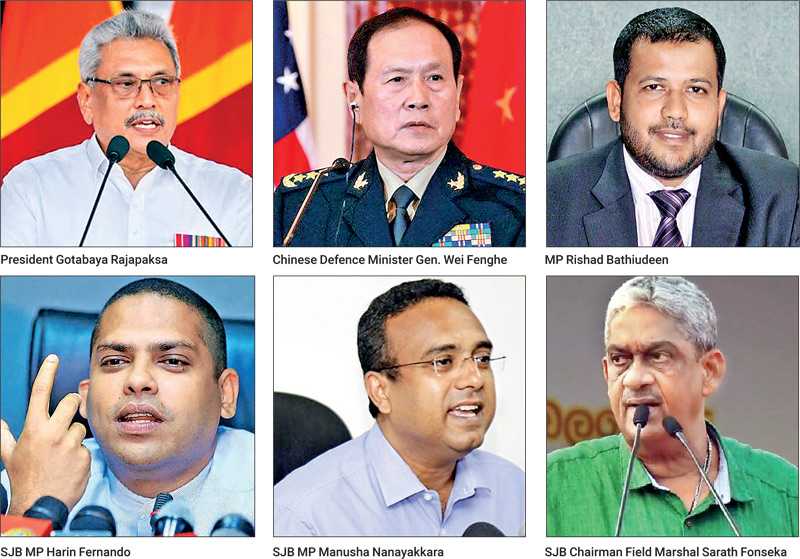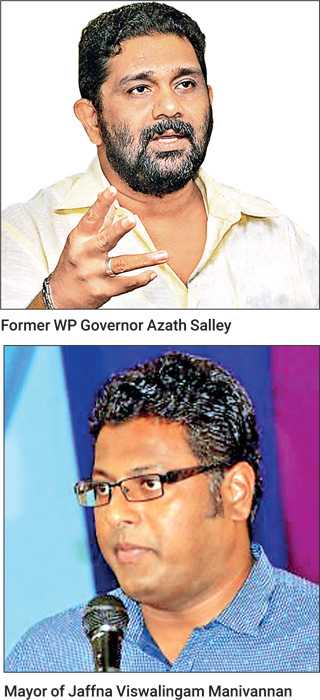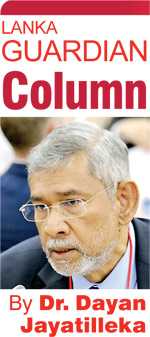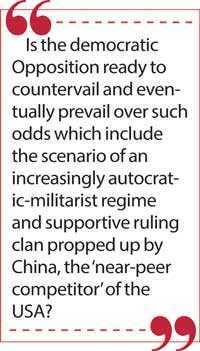Monday Feb 16, 2026
Monday Feb 16, 2026
Thursday, 29 April 2021 00:00 - - {{hitsCtrl.values.hits}}

“President Gotabaya Rajapaksa, in his phone conversation with President Xi Jinping on 29 March, expressed a wish to learn governance experience
from the Communist Party of China…” – Ambassador Qi Zhenhong, Daily FT, 28 April 2021
 Before any vaccine was available, New Zealand and Vietnam beat COVID-19. NZ just recently had a concert with a 50,000 audience. Perfectly safe. So, it is plain wrong to assert that the “only” solution is inoculation.
Before any vaccine was available, New Zealand and Vietnam beat COVID-19. NZ just recently had a concert with a 50,000 audience. Perfectly safe. So, it is plain wrong to assert that the “only” solution is inoculation.
Shouldn’t securing a top-level advisory team from NZ be far more pressing a Governmental priority than pushing through the Port City legislation? Not being Carrie Lam and this not being Hong Kong, shouldn’t President GR be phoning Prime Minister Ardern in-between those calls to/from President Xi?
COVID cascade
Such a call would not be made because of the regime’s need to maintain the myth of the superiority of the military-led/military-centric Sri Lankan model strategically partnered with China.
The Government opened the floodgates for the latest, perhaps most dangerous wave of COVID-19. It patted itself on the back for its inoculation campaign. The President was heard to say on TV that the emphasis has now shifted from PCR testing to inoculation. This was not only without ensuring capacity to continue inoculation, still less administer the booster-shot, but more importantly, without taking into account the warnings by the GMOA and PHIs as well as independent medical analysts such as Dr. Ravi Rannan-Eliya who deployed worldwide data to emphasise the importance of testing as the key variable.
The most irresponsible and symbolically arrogant single act of the government with regard to the COVID crisis was the generalised relaxation of restrictions on tourist arrivals proudly announced at Ministerial level even after the risky Ukrainian influx.
Meanwhile, the abrupt rhythm of policy pronouncement without due deliberation, continues. The President announced his intention to ban all imports of chemical fertiliser soon, and utilise the savings to pay allowances to farmers if a need arises to compensate for any loss of income. He did not take into account a likely drop in productivity due to the ban as well as the inability of local organic fertiliser production to pick up the slack, and the resultant shrinkage of food supply, leading to higher prices.
Decisions of this sort should be arrived at by consultation with all sectors; scenarios should be mapped out and implementation phased out; not effected ‘soon’ as the President announced with cheery determination.
 Crass, counterproductive crackdown
Crass, counterproductive crackdown
There are disturbing developments on the political front, chiefly the dramatic arrest under the Prevention of Terrorism Act, of Muslim Member of Parliament Rishad Bathiudeen. Though the charge pertains to the Easter massacre, his lawyer points out that he has not been named in the Easter Commission Report as culpable in any capacity.
His arrest comes mere weeks after the similar arrest of the outspoken Azath Salley and the Mayor of Jaffna, Viswalingam Manivannan, all political personalities in the democratic mainstream. The uncontradicted rumour of arrest swirling around Harin Fernando, the outspoken young SJB MP, completes the picture.
The Government’s answer that the arrests (except for Manivannan obviously) are taking place in the course of cracking down on those who were involved in the Easter massacre, is rendered less than totally convincing by the questions raised in the recent Parliamentary speeches of Harin Fernando and Manusha Nanayakkara of the SJB.
Though their questions about the Deep State raised howls of protest, there hasn’t been a single statement by the Government, rationally rebutting those pointed Opposition allegations and inferences. If Harin and/or Manusha are arrested, it would only entrench in the public mind their queries about Easter.
In matters concerning elected representatives of the people, arrest should be the last resort. This is more so when they represent aggrieved minority communities. Issues should be handled with civility and discretion and with proper regard to Parliamentary norms. This is surely to be expected on the watch of President Gotabaya, whose father, uncle, cousins and brothers were/are legislators.
Having lived through the turbulent decades of Sri Lanka’s history since 1971, I cannot recall a single period in which so many political personalities of the democratic mainstream were arrested, and in so short a time—a matter of weeks—on charges related to security in general and terrorism in particular. The last such occasion was the stretch from the fake ‘Naxalite Plot’ of late 1982 to the aftermath of Black July 1983—and the fake charges against the Left. That season of arrests was the portal to decades of chronic conflict and systemic instability.
It is not that those arrested were radicalised and later turned to violence. It is that the arrests weakened and discredited the moderate Opposition as helpless, and gave a signal to alienated youth that path of peaceful democratic change was narrowing or had closed. It is to repair and reverse that damage that President Premadasa lowered the electoral cut-off point required for representation in Parliament.
The Government’s move in Parliament to drop all cases classified as political victimisation is unnecessary and counterproductive. Any fake charges could have been dropped by the AG’s Department or dismissed by the judges themselves. Those cases which could have been heard and dismissed, thereby clearing those charged, will now hang over their heads in the social imagination as having been dropped by Parliamentary intervention. The Parliamentary move will not confer legitimacy. Those named will be unfairly presumed guilty at the bar of public opinion and posterity.
What is still more counterproductive is that the recourse to a Parliamentary steamroller will only solidify the case against Sri Lanka made by at least two successive UN High Commissioners for Human Rights to the effect that the system is so over-politicised that justice cannot be served within or through it and therefore accountability requires international inquiry and adjudication.
Seeking patron and protectorate status?
As an island with an important strategic location, Lanka must be aware of its external environment, the period of world history it is living through, the choices available to it and the consequence of each choice.
history it is living through, the choices available to it and the consequence of each choice.
Since 1956 Sri Lanka punched above its weight by developing a vocation for combining an East-West Janus-face (Janus of course faced past and future) with strategic autonomy and diplomatic ambidexterity in the doctrinal garb of non-alignment. Whenever it deviated from that combination, it suffered greatly, as in the 1980s.
Tragically, under two successive administrations, that of the UNP-driven Yahapalanaya and the current Gotabaya presidency, we have deviated yet again from what had worked so well for us. From the foreign policy stewardship of Lakshman Kadirgamar – Kadirgamar was the best thing about the Chandrika presidency—through the wartime first-term of President MR (culminating in Geneva 2009), we pretty much maintained our dignity and balance. Not after that. Not since then.
In this week that Sri Lanka greeted the Defence Minister of China, a very important and superbly capable man who headed the rocket forces which have given his country an impressive A2/AD (Anti-Access/Area Denial) capacity, Colombo must realise that it has to play things very smartly. We must avoid making ourselves strategically more vulnerable, painting a target on our back by myopically seeking a fast-track build-up of our security through enhanced external patronage.
When I saw the bronze bust of Bobby Kennedy (from boyhood, my favourite American political personality) behind President Biden as global television ran the story of the presidential statement on Armenian genocide, I recalled RFK’s book on the Cuban Missile Crisis: ‘13 Days’. Perhaps Sri Lanka’s policymakers should acquire copies so as to comprehend the parameters of the strategic sovereignty of even the most admirably independent and superbly-led island on the doorstep of a world power, leave alone one such as ours. Cuban troops fought in Africa, across the Atlantic, but there was a limit to the projection of external (i.e., Russian) power into the US sphere. Furthermore, the revolutionary Cuban leadership was Realist enough never to move on Guantanamo. Serious students of Cuba have known for a few decades now, that which Bobby Kennedy did not and could not have known at the time. As I have recounted in my book on Fidel, the stationing of the missiles in Cuba was not an idea that came from the Cubans, but from the Russians. After much deliberation and with some reluctance the Cuban leadership agreed. Against the wishes of Fidel, the Russians denied the existence of the missiles at the UN, but the truth was revealed shortly afterwards.
The missiles were withdrawn due to the US blockade and ultimatum—but what is less known is that there was also a trade-off. That trade-off was the removal of US Titan missiles targeting the USSR from Turkey. Nobody really knows whether that was the Russian game-plan in the first place, but if it were, it was unknown to Cuba. There’s a lesson in that for Sri Lanka, a small state.
Two systems, two value systems
The keywords currently in vogue in China-Sri Lanka relations and indeed in US analytical literature on China, are ‘systemic’, ‘governance’ and ‘model’. Humanity seems to be faced at this point in history with a choice of systems exemplified by the USA and China.
Recently the world saw how one system works. That was when Derek Chauvin, a police officer belonging to the white majority in the USA, was found guilty by a jury of his peers, on three counts of murder for the killing of a black man, George Floyd, in a trial which was televised live, worldwide. That is what American democracy is capable of at its best. A stark contrast with the Derek Chauvin case is contemporary Sri Lanka where the President pardoned a soldier belonging to the majority community who had been sentenced for murdering Tamil children including by slicing the throat of a five-year old.
In the global battle between competitive constellations of systems/governance models/values, I prefer liberal-democratic values of freedom and liberty, and salute Churchill’s wry description of democracy as “the worst form of government, except for all the others”. We face at least for a few more years, the model of a Sri Lankan autocratic democracy ‘with Chinese characteristics’. The prospect arises because “President Gotabaya Rajapaksa, in his phone conversation with President Xi Jinping on 29 March, expressed a wish to learn governance experience from the Communist Party of China (CPC)” (Daily FT, http://www.ft.lk/columns/How-China-eradicated-extreme-poverty-Part-1/4-716895). Note “learn,” not “learn from”. The danger also arises from a specific possibility flagged with characteristic flair by Field Marshal Sarath Fonseka, the SJB’s Chairman, in remarks about the Port City:
‘“A few businessmen may try to run it through this commission. There is a chance that Chinese businessmen will be appointed. It will be in their interest to keep the present government in power,” he said. “The Government will then forget about the people and start working for [these businessmen],” he added.’ (Chinese intervention in Port City could pose danger to both Sri Lanka and region: Opposition MP Fonseka | EconomyNext – https://economynext.com/chinese-intervention-in-port-city-could-pose-danger-to-both-sri-lanka-and-region-opposition-mp-fonseka-81096/).
Opposition landscape
Is the democratic Opposition ready to countervail and eventually prevail over such odds which include the scenario of an increasingly autocratic-militarist regime and supportive ruling clan propped up by China, the ‘near-peer competitor’ of the USA?
There is a complete lack of structured political dialogue between the democratic Oppositions of south and north. Given that the striving for a new, non-presidential, non-unitary constitution has been electoral kryptonite for any southern political force associated with it, and given also that the SJB Leader, but not the JVP (or FSP), has repeatedly endorsed the implementation of the 13th Amendment and opposed its deletion or dilution, there is an obvious political equation that is feasible.
Of course, the northern opposition may deem this insufficient and run its own presidential candidate or abstain (as in 2005) and thereby elect a personality perceived as China’s candidate, to the presidency.
The strengths of the Left—the JVP and FSP—are communicative clarity, cohesive organisation, high morale and combative spirit. The weakness of the Left is sectarian ego-centrism. The Left parties should link-up either (a) with each other or (b) with the populist SJB, pushing it leftward, or do (a) and then (b). They should remember that Gotabaya Rajapaksa enlisted in the Army in late April 1971, after the 5 April insurrection.
 Change the construct
Change the construct
A Port City candidate may manage to prevail, however narrowly, so long as the democratic Opposition is unable to change or escape the ‘construct’ which captured the public imagination: the weakening of the state, nation and national security by neoliberal democracy, and the question posed to the Sinhala-Buddhist majority—“do you really want to risk going back to that?”. That construct caused a tectonic pan-Sinhala shift which cannot be reversed by the disastrous optics of swearing fealty to a State-debilitating project and rounding up the usual suspects for a united front.
There is however, a way to square the circle, ensuring a strong democratic republic; a centripetal state and overarching national leadership directly drawn from the citizenry of the island-nation taken as a totality, fused with a deeper, broader, more progressive democracy and a systemic balance of power.
The periodical Social Justice was founded in 1962 by the iconic Catholic intellectual and Rector of St. Joseph’s, Fr Peter Pillai. Later edited famously by respected Asian radical theologian Fr. Tissa Balasuriya, it is now published by Fr. Rohan Silva, Director of the Center for Society & Religion (founded by Fr. Tissa). Its Chief Editor is Prof. Shanthikumar Hettiarachchi. The landmark 200th Edition of Social Justice is dedicated to the theme ‘Constitutions & Institutions’.
The joint editorial by two young Guest Editors, Gehan Gunatilleke (Harvard and Oxford) and Kamaya Jayatissa (Sorbonne and Science Po) is almost a manifesto, and as it unfurls, recalls the great Republican balance which, to my mind as a political scientist, can disintegrate the regime’s ideological ‘construct’ and its purchase on the public imagination:
“Strengthening the role of the executive can only be justified if executive power is checked through the separation of powers among the three traditional organs of government. For instance, in France the Head of State, despite being referred to as a ‘Republican Monarch’, is kept in check through the other two branches of government, especially the legislature. As such, in France, the Constitutional Council plays a particular role in the institutional structure of the Fifth Republic. Its establishment by Charles de Gaulle was meant to guarantee respect for the new division of powers between the executive and the legislature, as well as to prevent parliamentarians from circumventing the constitutional provisions that govern them. The establishment of the Council thus came following the need to redistribute powers.” (Social Justice,
March/April 2021, pp. 03-08)
The model of an executive presidency with checks-and-balances, fused with a commitment to ‘constitutionalise’ human development and socioeconomic rights as advocated by the Guest Editors of the Social Justice 200th edition (pp. 06-07), can constitute the platform of a counter-hegemonic project against the ‘China candidacy’ of a Rajapaksa sibling or a Sinhala General Al-Sisi with an Egypt-Myanmar mindset.